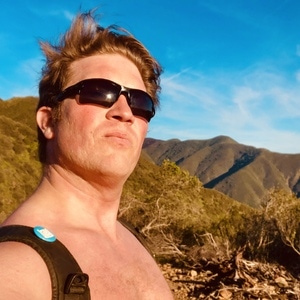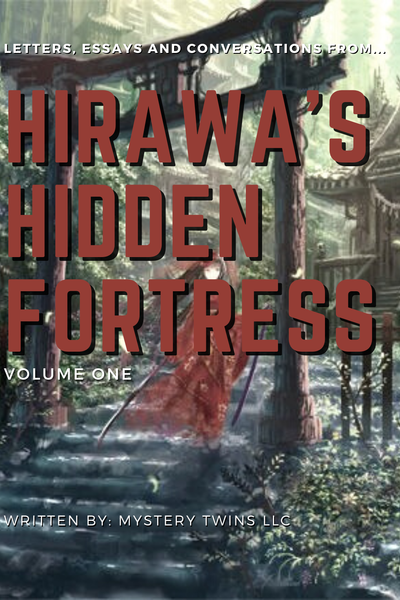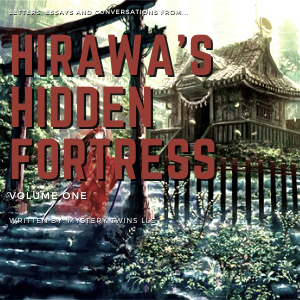Two: Surrender is Cyclical
Even after bearing witness to the horrors of two world wars, I was not one to remain idle for long. My wife had encouraged me to rest, enjoy our spring break in the golden isle of Jamaica. Instead, I answered the ringing phone in our bungalow.
The voice of a man who currently had a cigar hanging sideways in his mouth spoke through a coughing fit, “Commander Calloway, you slothful son-of-a-bitch, you’re a hard man to get a hold of.”
“Uncle George, you’re exactly the first person I’d expect to find a number I was told would remain unlisted,” I laughed while taking another sip of disappointing rum. Uncle George was the current lead publisher of the SF Chronicle. He was a charitable, resourceful man, and an old friend of the family on my wife’s side. He was the last person I wanted to speak with.
“I’m in need of a curious mind with a particular set of skills,” George said in that deep, perpetually hoarse voice of his, “Something big, front page big, national news has come up. We’ve got a chance to be one of the first for an in depth scoop. An exclusive!”
I let the subtle spice linger in the back of my tongue before swallowing another sip. My glass was empty. So was the bottle. As for my mind, I’d become significantly less curious about the atrocities men were capable of than I had been in my youth. That sense of curiosity Uncle George mentioned had long been beaten out of me. Or, so I thought.
I spoke slowly, the alcohol doing its job to dull my annoyance; “Am I to understand you’re offering me a job--?”
“--A Job?!” George cut in, coughing, incredulously, “I’m offering you the story of a lifetime! You’re the only man suited for this particular assignment.”
A wry smile tugged at the side of my face, “No one else wanted to take it, did they?” I waited a moment. Listening. There was a muffled commotion on the other end.
“Cameron, we need you on this one. If you’re not interested in the personal glory of discovery, I’m afraid I’ll have to appeal to your sense of honor.”
Honor.
Like liquid bleach, the word erased the taste of rum from my mouth in an instant. I’d grown to resent that word. It felt hollow. As a naval officer, I’d believed we were held to the highest standard of conduct. That notion had been tainted. Of course that belief was one I’d kept to myself. One didn’t talk about such dissenting thoughts, or feelings. In this day and age, the honorable thing to do was simply drink away those concerns.
Having found my way to the bottom shelf of the rum offered on this beautiful island, I’d failed to find anything strong enough to permanently drown my bitterness. We’d won the war. Bitterness wasn’t meant to accompany victory. Yet, there I stood on the deck of Mighty Mo at attention among my fellow officers. I watched the Japanese High Command surrender to McArthur and Nimitz. I remember those grave faces of men both humbled by an enemy force and simmering in the rage, the bitterness of defeat. How many of my fellow officers and enlisted men also felt that same brackish taste left behind by our victory?
It would be recorded by General McArthur’s personal pilot that his feelings mirrored my own. A shallow comfort. We’d dropped a weapon of such destructive force not once, but twice upon civilian targets. It was beyond abhorrent. At the time, I recall journaling my thoughts on the manner as akin to a grown man striking an infant repeatedly with a metal pipe. There was no honor to be found in such actions.
“Cameron,” George’s voice was hushed, silencing my mental wounds that had been ripped open anew; a familiar nightmare that bled into my vacation. “We need to get ahead of this discovery, control the narrative. After everything that’s happened to the Japanese-American citizens and those abroad, people need to see what’s happened as a miracle, not an invasion.”
There was a pause as the words echoed in my not so sober head, “An invasion?” The words fell out of my mouth. Silence remained on the line for a moment more.
“Cameron, I have a plane ticket with your name on it. First flight out tomorrow. Can we count on you?”
---
My wife elected to stay in Jamaica. She wasn’t thrilled that I’d surrendered to my sense of duty to help a friend in need. We didn’t part on pleasant terms. But, she at least agreed that doing something to curb my lethargy was better than lying in languid depression. She’d have word’s with Uncle George later; Jenny was never shy on words.
On the opposite end of the verbal spectrum, Geroge had been tight lipped to elaborate any further on the assignment over the phone. For the lead publisher of a national newspaper, not wanting to share information seemed atypical. A spark of curiosity attempted to reignite itself within my mind. My pen flew across the legal pad on my lap. A mess of half formed thoughts and wild guesses.
When was an invasion not an invasion? Not even a full year had passed since the formal end of hostilities. Had the Japanese actually chosen to retaliate? Their strike on Pearl Harbor had sought to surgically shut down our navy. As it had been coined, the attack only awoke a sleeping giant.
Had we been foolish enough to believe that the conviction of the Imperial Fighting Force of Japan would willingly surrender after what we had done to their people? Had we not seen the lengths they were willing to go to ensure victory?
Not an invasion.
A miracle.
I needed more information. I needed sleep. I would receive neither during the entire journey back to the States and the Chronicle's office on 901 Mission Street.
---
George Cameron sat behind a large, bone-white oak desk. The circular floor to ceiling window behind him was obscured by the equally large clock face that hung on the exterior of the building. Mentally flipping the hands to their correct orientation, the time was half past two in the afternoon. Not that it mattered. My body was still set to Island Time and sorely missed its regular supply of poorly distilled rum.
“Go ahead and shut the door behind you, Calloway. Come have a seat,” George hadn’t looked up from an open file he’d been examining. His glasses hung precariously on the edge of his nose as he read the briefing.
Another man, haggard with a crew cut and wrinkled black suit stood up from his chair opposite George and extended his hand, “I appreciate you agreeing to cut your vacation short, Commander.” He was barely out of his thirties but had the unmistakable look of a man who’d seen his share of combat. Hands like worn leather gloves and a smile that only came into existence out of bitter obligation.
“Ah, my apologies,” George said. He droped the tan folder on the desk and lit a fresh cigar, “This is Agent Kapalini from the Bureau. He’s the lead investigator on what’s going on up north.”
“Again, can’t thank you enough for…” Kapalini stopped himself short having caught my expression: I wasn’t one for needless platitudes. Less so with the lack of rum. “Straight to the point then?” Kapalin's eyes quickly scanned the rest of my body language and answered his own question.
My eyes darted over to the brandy George kept on the top shelf behind his desk. Reading the room, George opened the wooden case and poured three short glasses.
“Of course,” Kapalini began and carefully laid out the facts of the case.
The Murder of George McMenamin.
The Slaying of the Bend Militia members and two National Guardsmen.
The canvas scroll with a cryptic invitation.
“Despite my warnings, my superiors pulled rank, added an extra five-hundred troops to my ranks and ordered them to march into the quarantine area,” Kapalini said, slamming back his brandy.
I hung my head, knowing full well what usually happened to well-trained troops against embedded guerrilla fighters; “How many did we lose?”
“Two… Technically,” Kapalini said, voice clipped.
I set the brandy back on the desk, and set my jaw, “What’s the technicality? Non-fatal injury?”
“Tell ‘em what you found out there, Agent,” George spoke in a tone that suggested he was hard pressed to believe the story he’d recently heard prior to my arrival.
Kapalini pushed his glass forward on the desk for a refill; “We’d cordoned off the two square mile section of forest that, when breached, would insight enemy action. We got our marching orders, entered the black out zone roughly thirteen miles from town. No enemy action. Not a peep.”
I scratched my head, “Had they already fled the area?”
George snorted, “They set up camp.”
Kapalini held up a hand to correct; “What we found was, for lack of a better term, a train terminal of sorts.”
I took another sip of brandy and began to sketch out the facts on my legal pad; “You found a train station in the middle of the woods?”
Kapalini elaborated with the details. Just the facts. The building itself was single story, wood and concrete build. Oriental ornamentation throughout including signage and postings. A handful of the troops had been with the army corp engineers and noted that the building itself hadn’t been constructed recently. Just glancing at the weathered siding and foundation, they estimated the station had stood for the better part of a year at least. The agent added that a few of the Guard’s Men were able to translated the largest signpost over the entrance in neon light:
“Hirawa Grand Terminal Station”
“After some dick measuring among the Agency Boys, our superiors and the National Guard chain of command, the DOJ ordered us to breach. First squad went in, guns drawn… Empty Station.” Kapalini took another long pull on his brandy, took stock of his audience's attention and continued. “We brought in two more squads, enough to board the single train sitting there at the platform.”
I gawked, “You were actually going to board the train?”
“Sure as hell weren’t going to walk the tracks,” Kapalini shrugged, “Not at first at least. Our orders were to investigate, detain, or neutralize any enemy combatant. So, we boarded the train hoping it would take us wherever they happened to be holed up.”
George puffed out another drag on his cigar, “I’d overlooked this detail from before, but did you operate the train car yourselves, or--?”
Kapalini made a sort of hopeless gesture with his hands; “It was all automated. The doors, the train; the moment our team of thirty boarded, the doors shut and we heard what we presumed was a recording of a woman who spoke something in Japanese. Then, off we went.”
“Went… Where? You don’t mean to say that along with a train station, tracks had also miraculously appeared out of nowhere?” My mind desperately wanted to arrive at the conclusion that this was all some elaborate hoax. The stone expression on both George and Agent Kapalini's face refused to let that notion settle.
Agent Kapalini gestured toward my legal pad. I obliged and slid him the pen as well. George and I watched as he produced a rough sketch of the station; “So once you enter through these large sliding doors here, line of sight is obscured by the shape and layout of the building itself. I pressume you've been on a subway platform before; there’s a bend in the track as it enters the tunnel so you can only go so far in.”
“What’s this here?” George pointed to several small box shapes opposite the train tracks. For a simple sketch, Kapalini had included an uncanny amount of detail to his illustration.
“Vending Machines,” the agent replied dryly.
George snorted. A puff of cigar smoke rolled out of his nose as he did so.
With my attention on the sketch, I asked Kapalini to continue, “What happened to the two men you lost? I presume it was an ambush as soon as you entered the tunnel.”
Kapalini sighed, “The two men out of the thirty we breached with were the ones that spoke passable Japanese.” Drawing his finger across the tracks on the page as he spoke, the agent continued, “We entered the tunnel. The two men are translating the recording all the while:”
“Attention passengers: welcome, please be courteous to others and remain silent during your journey. Stow all personal effects aside to ensure each passanger space within the car. His eminance, Shogun Hirawa thanks you for visiting our estate…”
Kapalini stopped, scratched his head. He’d dragged his finger in a circle through the tunnel and back around to the other side of the tracks to the station; “Thirty of us boarded. Twenty-eight of us came back to the station.”
The room was silent for a moment before Kapalini continued, “We did end up walking the tracks. We must have looped around more than a dozen times. Soldiers go in one end and simply come back out the other. We tried it backwards. Same results. We set up lights, gas powered generator and checked every centimeter of that tunnel; no hidden passages, secret doors. Hundreds of National guard troops had the building surrounded. Nothing!” The agent threw his hands up in the air, defeated.
I gestured to George for another glass.
“So, what’s the next move?” I asked hesitantly.
George stood up from his chair and poured himself another glass, “Washington wants to demolish the whole building.” Gobsmacked, the aged publisher drank down his finger measure of top shelf brandy in a single gulp, “They want to just blow it all to hell!”
Agent Kapalini expanded a bit more soberly, “The DOJ sees this as a foreign enemy combatant on US Soil, the first since 1812. If this situation got out publicly, which it will eventually, there’d be talk of putting Japanese-Americans back in entertainment camps… Could reignite the war.”
“We don’t even definitively know if it is Japanese, do we? At least, not an official--?” My voice cracked as I stopped short of rambling. My nerves beyond frayed. A Third World War months after the last had concluded? Those maniacs in Washington might even consider dropping an atomic bomb on our own soil just to ensure the idea of enemy action was eradicated. My mind spiraled further downward.
It was George’s voice that spoke through the madness, “We want to send you in to aid the investigation.”
My jaw dropped, “Me?”
Kapalini gestured with his hands out, pleading; “I asked Mister Cameron who he considered the most qualified to offer insight into Japanese culture, history--”
“Surely the Federal Bureau of Investigation… The Pentagon…?” My mind was reeling. I couldn’t keep a straight thought in my mind.
Kapalin nodded, “They're sending their people. I want someone I can trust. I argued for seventy-two hours to produce a rescue mission for our missing soldiers and solid facts before the National Guard acted. We’ve got less than twelve hours left on the clock.”
It would be another year from this point in history that the Doomsday Clock would be created by a handful of scientists to illustrate when they believed nuclear armageddon would begin. At this moment in history only a battalion of National Guard Troops, a room full of suits in Washington, and us three men in the clock tower of the San Francisco Chronicle were aware that the potential Doomsday was less than a day away. Naturally, I surrendered and jumped in the game.












Comments (0)
See all